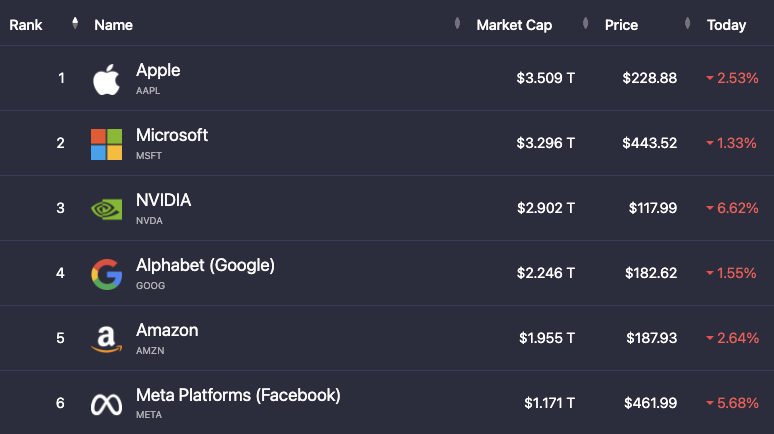We are not used to seeing Big Tech stocks decline while traditional stocks rise, but that’s exactly what happened when the Nasdaq fell 2.8% while the Dow rose 0.6%. The S&P 500 also declined, down 1.3%, due to its larger exposure to Big Tech.

The “Magnificent 7” dropped 3.3% as a group, with Nvidia and Meta being the biggest losers, down 6.6% and 5.6%, respectively.

Nvidia led the AI group of stocks to drop, particularly in the semiconductor sector. TSMC fell by 8% and AMD dropped 10%.

Since last week, small-cap stocks have outperformed large-caps. Although the Russell 2000 fell by 1% yesterday, it has been more resilient than large-cap stocks, gaining 7% over the past week compared to the S&P 500’s 1% decline.
At the start of the week, I came across an interesting observation by Charlie Bilello. He noted that the performance gap between large-cap and small-cap stocks was as large as it was 24 years ago during the Dotcom bust. This isn’t surprising considering the AI-driven rally and dominance of the Magnificent 7 have dominated headlines over the past year. What’s intriguing is Bilello’s point that during the next bull run, value stocks outperformed growth stocks by 114% over seven years.

Are we at a major inflection point? Are these early signs that small caps and value stocks will outperform from now on?
I think there is some merit to this thinking. Value stocks have underperformed growth stocks since 2017, and historically, outperformance alternates between the two. Therefore, some mean reversion effect must happen at some point, especially now when growth vs. value is at an extreme.
Another critical point is that value stocks have shown to perform better when interest rates are higher. If we look at JPMorgan’s chart below, we can see that value stocks perform better when the interest rate for the US 10-year bond is above 5%. One explanation is the discounting of future cash flows. When long-term rates are high, the future cash flow of growth stocks is heavily discounted, lowering their present value. This affects value stocks less since they generate cash flow today. Moreover, some value stocks like banks enjoy better margins when rates are higher, as long as rates don’t stifle borrowing.

One might ask why the increased market expectation of a looming rate cut helped value small caps and not growth stocks, since lower rates are better for the latter.
The reasoning is that although short-term interest rates are expected to fall, long-term rates have remained largely the same. Below is the yield curve showing the largest change in yield from a month ago is between 2 and 8-year bonds. The 10-year and beyond have remained largely the same.

This indicates that long-term interest rate expectations remain stable, above the 4% rate. Many investors believe we are unlikely to return to the near-zero interest rate era, at least not in the near future. Thus, it’s possible that interest rates may stay above 4% for a long time despite the Fed cutting rates a few times.
Why did small-cap and value stocks take so long to rally considering the “higher for longer” interest rate theme has been running for a while? It’s likely because the AI rally captured most of investors’ attention. This may be a delayed effect in a small-cap value rally.
At the same time, we shouldn’t write off growth stocks altogether. There is no certainty that the small-cap value rally will sustain, as it did fizzle out for months after a brief rally at the start of 2024. Also, AI-related stocks have run up so much that experiencing some correction is warranted and I won’t say the AI run is over just yet.
From a bottom-up perspective, one should still invest in good companies, whether growth or value, at fair or even cheap prices. Forming a diversified portfolio of both styles can hedge against market favoritism toward either style.

